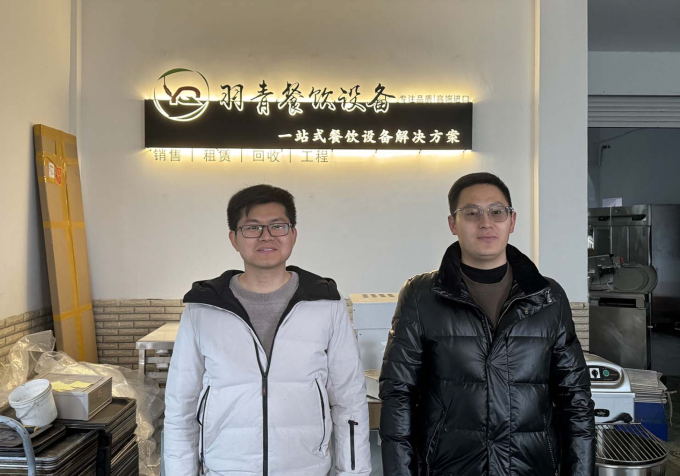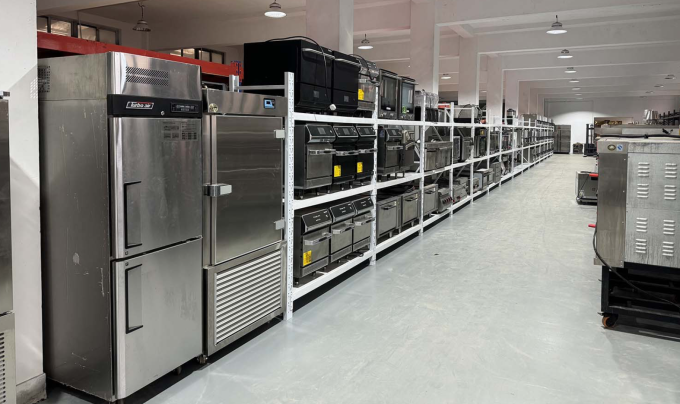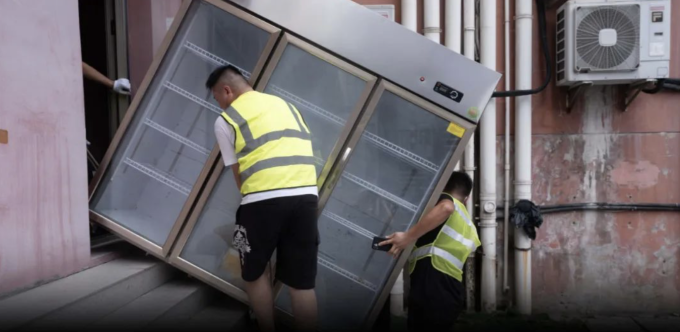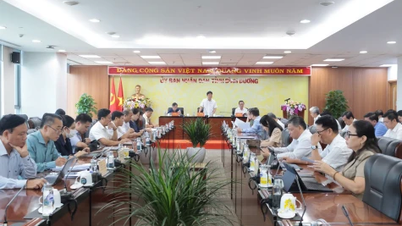China Many businesses, food and beverage stores that went bankrupt after the pandemic accidentally became business opportunities for second-hand dealers.
Feng Xing, 34, plans to open a new, larger warehouse in Jiading District, Shanghai, with enough space to house the 50 old industrial ovens he has purchased. After being refurbished and polished, these ovens can be resold at a high price.
To develop his used kitchen equipment dealership, Feng mortgaged his house. Although it was risky, this man believed he would succeed.
Second-hand dealers like Feng’s have thrived in recent years as the food and beverage industry has struggled. Many restaurants have closed, and owners are selling off equipment at low prices to recoup their investments.

Feng Xing (left) and his business partner in front of their new sign. Photo: He Qitong
Data from the National Bureau of Statistics of China shows that in 2023 (the first year after the country lifted strict anti-epidemic regulations), revenue in the food and beverage market reached nearly 5.3 trillion yuan, up 20.4% compared to 2022. However, the number of domestic food and beverage companies that had to close in the same year exceeded 1.2 million, double the previous year.
Feng Zing's used kitchen equipment business has grown steadily since its launch in 2019. He has expanded from a warehouse of a few hundred square meters to more than 2,000 square meters. In 2023 alone, the business is expected to be significantly profitable, with business volumes increasing by 50-60% compared to the same period last year, when the food and beverage industry returned to normal operations after several years of restrictions.
Most of the equipment purchased by the 34-year-old man is ovens and industrial refrigerators. These are indispensable items for food and beverage businesses and rarely lose value even when used.
Before purchasing, Feng and his staff must check the equipment's functionality, evaluate market demand, brand and condition to determine a reasonable purchase price, but no more than 30-40% of the original price.
At the factory, the equipment is cleaned, sorted, and resold. Some high-end equipment, such as coffee makers, can be resold for up to 90% of what they would cost new.
"We start work after about 10 p.m. when the restaurants close and often work through the night. It can take a week to move all the equipment of a large restaurant, some large-sized items can take up to a month," Feng said.

Interior view of Feng's new warehouse in Shanghai. Photo: He Qitong
In recent years, Feng's shop has begun buying used items in bulk from dealers across the country. This allows them to offer higher quality, more reliable equipment.
The success of agents like Feng has attracted other entrepreneurs to try their hand at the growing industry. Wang Rei, 32, has had several failed business ventures over the past decade, including restaurants and a media company. Since March last year, he has opened a new location that buys and supplies used equipment to coffee and beverage shops in Foshan, Guangdong province.
Wang has noticed a number of beverage stores closing recently. In January 2024 alone, he collected old equipment from three stores in one day.
According to Qichacha, more than 3.3 million food and beverage enterprises were established in China last year, compared with 2.57 million in 2022. Including more than 26,000 milk tea and coffee enterprises, up 18.8% year-on-year.
Increasing competition has prompted major beverage chains to continuously launch communication campaigns, expand franchise chains and joint ventures to attract customers. However, there are still many risks when not thoroughly researching the market, lacking management skills leading to heavy losses.

The second-hand goods business is growing as more and more shops and restaurants go bankrupt due to the impact of the pandemic. Photo: Zhou Pinglang
Wang said a store where he bought the machines in November had been opened just a few months earlier by a woman in her 30s who invested 300,000 yuan in the store after seeing an online ad looking for a franchise. Business was slow and the franchisor did not provide enough support, causing the unit to soon go bankrupt and liquidate all its equipment.
The stories of heavy losses are all too familiar to Feng. He once bought used goods from a client who lost 800,000 yuan within months of opening a restaurant in Shanghai during the pandemic.
Some have criticized the secondhand business for profiting from the failures of others. But Feng says his service helps store owners recoup some of their investments, while also providing new stores and businesses with an affordable way to buy items.
Minh Phuong (According to Sixthtone )
Source





![[Photo] Prime Minister Pham Minh Chinh meets with US business representatives](https://vphoto.vietnam.vn/thumb/1200x675/vietnam/resource/IMAGE/2025/5/13/5bf2bff8977041adab2baf9944e547b5)

![[Photo] President Luong Cuong attends the inauguration of the international container port in Hai Phong](https://vphoto.vietnam.vn/thumb/1200x675/vietnam/resource/IMAGE/2025/5/13/9544c01a03e241fdadb6f9708e1c0b65)



























































































Comment (0)